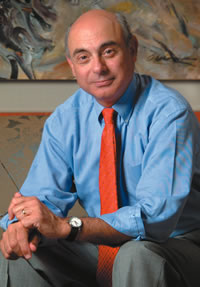

Michael M.E. Johns

It is in everyone's interest to strengthen public support for Grady's missions and services.

In this issue
From the CEO / LettersPromises writ in stone
Taking care of people
Taming the obNOXious enzyme
Moving forward
Noteworthy
On Point:
Communicating medical errors

If you read the papers, you know that Grady Memorial Hospital, one of our most important partners in providing health care in the Atlanta community and in training the next generation of physicians, is facing familiar problems with a new intensity. Challenges the hospital was able to handle ten years ago have reached perfect storm proportion. These problems are not peculiar to Grady. Hospital health systems across the country - especially those that primarily serve Medicaid, uninsured, and indigent populations - are experiencing budget crises caused by a surge of uninsured patients, combined with falling reimbursements from public and private payers and reduced tax revenue support. At Atlanta's only public hospital, the number of uninsured patients continues to grow, while Fulton and DeKalb county commissioners vote not to raise their payments to Grady. The two counties, which have contracted with Grady to care for their indigent, now cover only roughly half the costs of the services the hospital provides their citizens. Other counties do not contribute to Grady at all, despite the fact the hospital also serves many of their residents.
But there is good news too. New Grady CEO Andrew Agwunobi appears to be a strong leader with the resolve, experience, vision, and sheer energy to take on these challenges. A pediatrician with a Stanford MBA, "Dr. Andy" is the former CEO of South Fulton Medical Center, which he helped rescue from the brink of bankruptcy. He arrived at Grady with his shirtsleeves up and already has made significant changes. One of his first initiatives is an "aggressive transparency" movement aimed at opening Grady up, talking openly to elected officials and the public and employees, and providing all Georgians more information about Grady's unique strengths and value to the community.
At Emory, we too want the community to realize that the Grady Health System is an extraordinary and indispensable resource for Atlanta and the region -- not just for those without resources but for all of us. We know it firsthand. With more than 700,000 patient visits annually (including some of the most complex cases seen anywhere in Georgia), Grady can provide great care to so many because of its long-standing relationships with the Emory and Morehouse schools of medicine. Grady is the city's safety net for a growing number of uninsured and underinsured patients, people whose health is of vital importance to the economic health of the city. In addition, the hospital maintains readiness for large-scale disasters, even though the hospital's resources already are stretched.
But Grady is not only about numbers and poor people -- it's also about superb medicine. As the doctors at Grady, we and our colleagues at Morehouse take pride in the fact that Grady patients receive some of the finest medical care in the country. We're happy that Grady's new CEO also wants people to recognize Grady for the extraordinary care offered there, in the region's only level 1 trauma center, for example, and in nationally recognized centers for burns, cancer, infectious disease, poison control, as well as many other vital medical services.
But with appreciation must come support. It is not only in Emory's interest but also in the interest of all Atlantans and our state that public support for Grady's missions and services be strengthened and its budget problems acknowledged and addressed. I urge all Emory faculty and staff, especially those who live in Fulton or DeKalb county, to let your county commissioners and other public officials know how important it is to support Grady's health care missions. Whether we are health care providers or business leaders, ensuring and improving the health status of our community is fundamental to all else that we do.
Michael M. E. Johns
Copyright © Emory University, 2003. All Rights Reserved.
Send comments to the Editors.
Web version by Jaime Henriquez.